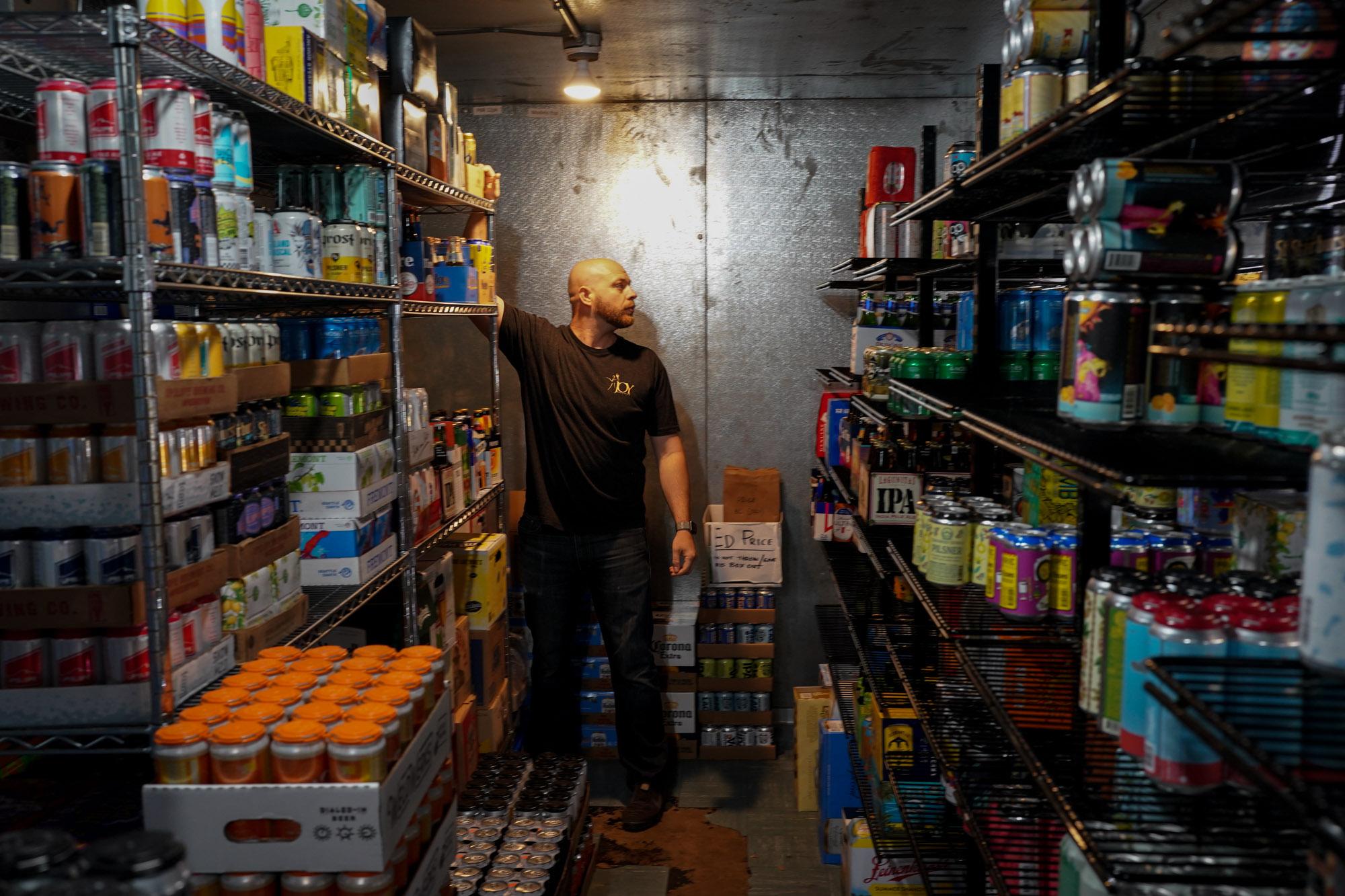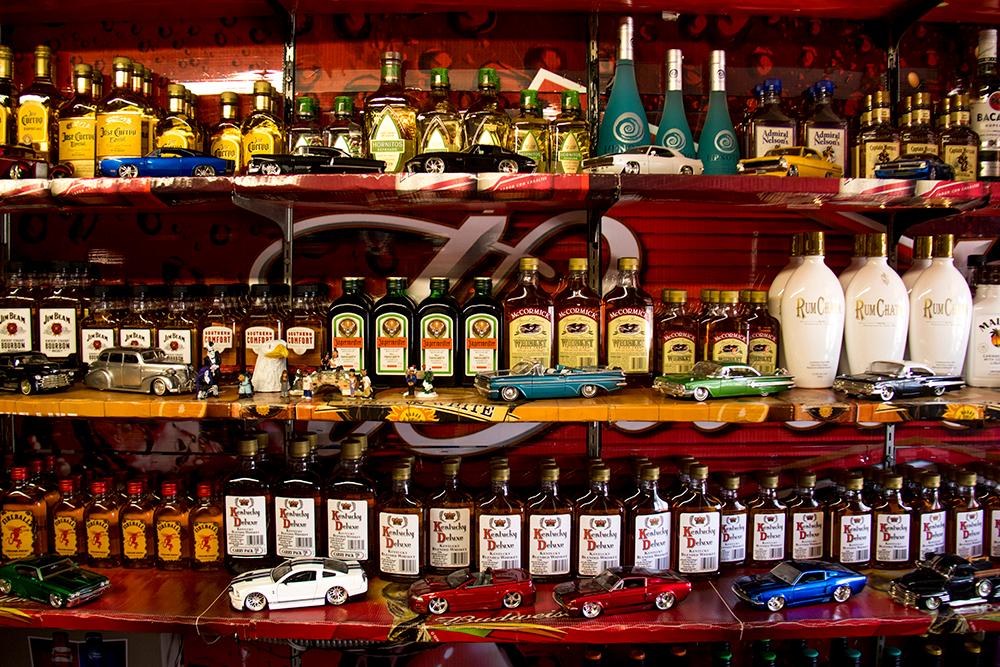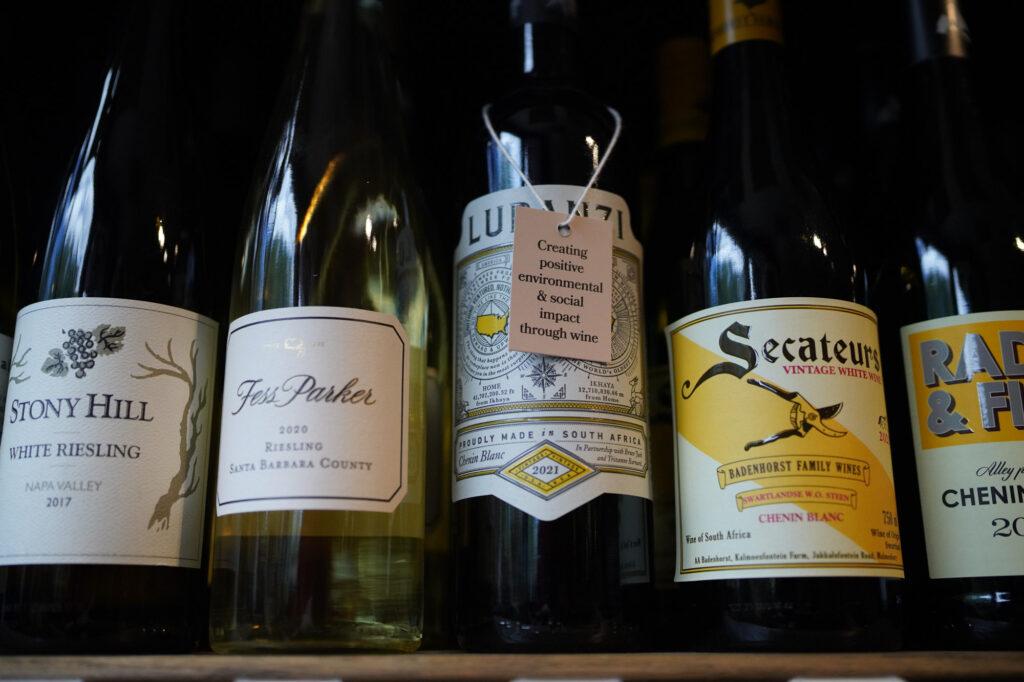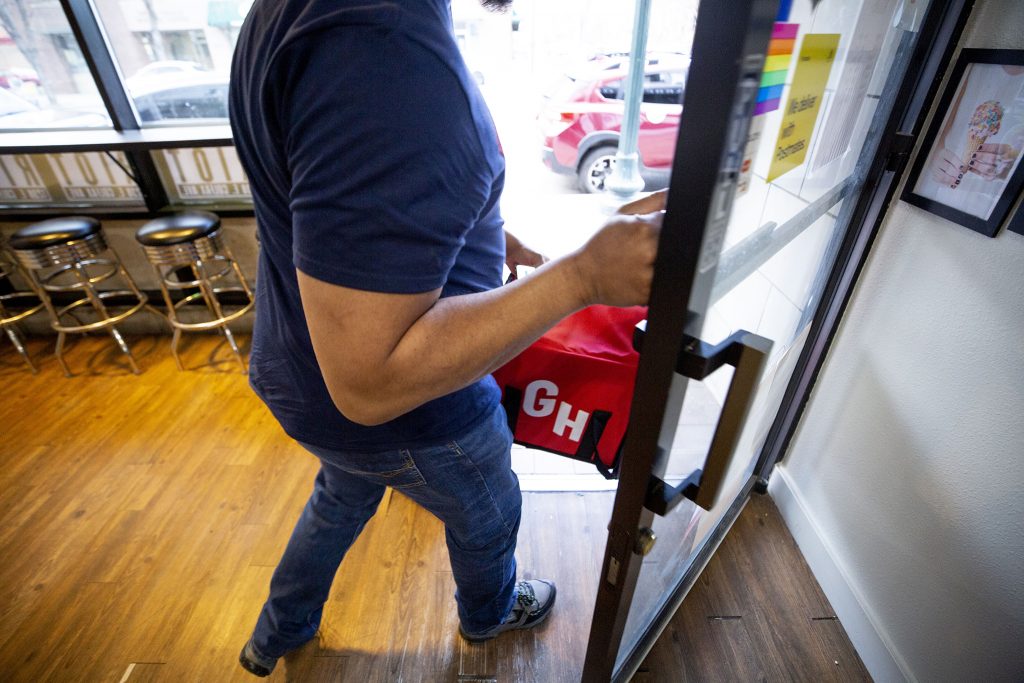
Buying alcohol could soon look a lot different in Colorado — if voters approve a series of controversial and well-funded ballot initiatives in the November election.
Right now, small liquor stores are a central part of the state’s retail alcohol industry. Thanks to restrictive state laws, individual stores and small chains are the most common options to buy wine and spirits and to have alcohol delivered.
Three proposals on the ballot — propositions 124, 125 and 126 — would open up those markets to larger players, including chain liquor stores, national grocery giants and online delivery platforms like DoorDash.
It’s the latest battle in a decades-long war. The fight over the state's unusual alcohol laws has been around nearly since time began, as one state lawmaker put it, joking that Prohibition was probably no more than a brief ceasefire.
But this round could be the most consequential yet, according to some of the players involved, and the measures have attracted millions of dollars in funding to support them.
“This is the biggest change to Colorado liquor law since Prohibition, if these three (measures) were to go through,” said Chris Fine, executive director of the Colorado Licensed Beverage Association, which represents some of the state’s liquor stores and opposes the measures.
If all three measures pass, Coloradans will soon be more likely to buy wine in a grocery store; pick up alcohol from a big chain liquor store; or get the hard stuff delivered straight to their doorstep.
The politics — and the policy — are complicated. The three proposals have different groups of supporters and opponents. Here’s what it could all mean for the industry.
The status quo right now
For decades, small liquor stores had a lock on the state’s alcohol market. It was a heavily regulated, restrictive system that went back nearly a century.
When the nation’s anti-alcohol laws were repealed, the Colorado authorities “were so worried about bootleggers and unlawful actions, they made it so it could never be corrupted again,” said Jim Shpall, co-owner of Applejack Liquors.
For decades, only liquor stores could sell most packaged alcoholic beverages. And an owner could only control a single liquor store. For example, Applejack was limited to a single location for decades after its founding in 1961.
“That’s all we were allowed,” Shpall said.
Meanwhile, the state’s grocery stores were allowed to sell only reduced-strength beer, up to 3.2 percent alcohol by weight. That limit was the subject of lots of debate, including a failed ballot measure in the 1980s and threats of similar initiatives in recent years.
A major change finally came in 2019, when a new state law that had passed in 2016 allowed full-strength beer sales in convenience and grocery stores. The bill, which was approved by the legislature, was supposed to be part of a “grand compromise” that would keep everybody happy and avoid a fight at the ballot box.
“This was the biggest seismic shift of alcohol laws in the state of Colorado since the 1930s. And everybody agreed, ‘Hey, kumbaya, we're gonna work together,” said Mat Dinsmore, general manager and a co-owner of Wilbur’s Total Beverage in Fort Collins.
Under that deal, more than 1,000 grocery and convenience stores were allowed to start selling full-strength beer in 2019, taking turf that was previously owned by liquor stores. The deal also allowed grocers to make slower moves into the liquor and wine markets.
But despite its billing as a long-lasting agreement, the new laws left many players wanting more. And that’s why Colorado voters today face a confusing array of different ballot initiatives.
For some who’ve worked on alcohol sales policy, putting these questions to the public is the right way to determine whether anything needs to change.
“Truly, I think it's just a desire to see what voters want and what the consumers want,” said the late Republican House minority leader Hugh McKean in an interview last week. McKean passed away suddenly over the weekend.
Before his death, McKean hadn’t endorsed any of the measures, but described the current system as “somewhat archaic.”
In contrast, Rep. Daneya Esgar, a Democrat who was involved in the earlier dealmaking, said she was not happy to see this year’s ballot measures.
“I was, quite frankly, disappointed because these were all things that were discussed and negotiated,” she said.

Prop. 124: Where will you buy liquor?
Proposition 124 would allow liquor store chains to eventually have an unlimited number of locations; right now, they can only operate three. If it passes, you could see current liquor stores growing into statewide brands, or the expansion of out-of-state chains, as they try to keep up with new competition from grocery and convenience stores.
Some liquor store owners think that’s important because the 2016 law left them at a major disadvantage. At the time, they knew that grocery stores would immediately start selling beer. But they were equally worried about the chains’ long-term interest in spirits and wine.
That’s because the 2016 law didn’t just affect beer sales. It also allows each grocery and convenience chain to offer a full array of beverages — beer, wine, spirits — at some of their stores. Currently, the limit for grocers is eight full liquor licenses per company. But by 2037, they’ll be allowed to hold an unlimited number of the full licenses, as long as they can meet certain requirements, such as buying out nearby liquor stores.
Meanwhile, liquor stores still face much tighter limits on their growth. They’ll only be allowed to reach a maximum of four stores each, ever, under current law. Prop. 124 would change that, allowing them to add licenses on the same schedule as grocers.
“I’ve been trying to get parity or a level playing field ever since (the grand compromise),” said Shpall, of Applejack.
“I don’t have the buying power that (grocery chains) have, I don't have the clout with suppliers that they have. They’ll be able to run roughshod over us, unless I can have the ability to grow and develop a business that's competitive,” he added.
But some liquor store owners disagree. They see Prop. 124 as adding another competitor — national liquor chains — on top of the threat from grocery stores. Fine, with the Colorado Licensed Beverage Association, points out that while Applejack is a Colorado business, it’s partially owned by Fios Capital — giving it financial firepower that few other businesses have, he argued. (Shpall points out that Fios is a partnership of three Colorado-based owners.)
The idea that small local chains can keep up with national competitors is “delusions of grandeur, a little bit,” Dinsmore said. Prop. 124 “opens a floodgate for other out-of-state chains to come in and have no resemblance of Colorado-owned or -based independent retailers left,” he said.
People and an LLC affiliated with Total Wine & More, a national chain, are the only major funders of the Prop. 124 campaign; they’ve donated nearly $9 million in cash and indirect funding so far, according to recent fillings.
Total Wine already has the maximum three stores in Colorado and has become a villain for some liquor store owners, with one owner reporting that he lost more than $1 million in sales after the chain moved in nearby.
If the measure passes, chain liquor stores will still face obstacles to their expansion. They would still have to get approval from local authorities and open up at least 1,500 feet from existing liquor stores.
The group opposing Prop. 124, Keeping Colorado Local, has only reported raising about $636,000. It also is fighting against the other alcohol propositions.

Prop 125: What about wine?
There’s a proposition for that, too. Proposition 125 would make it much easier for grocers and convenience stores to sell wine, instantly converting hundreds of locations from “beer only” to “beer and wine.”
Proponents of the change say it’s all about consumer choice, giving people the option to pick up a bottle of red or white as they shop for dinner. The bill's proponents say 39 other states allow grocers to sell wine with minimal restrictions.
But liquor store owners see this as one of their biggest threats — and a betrayal of the earlier agreement, which they had hoped would last 20 years.
“Did they go back on their word? They absolutely did,” said Andy Boian, a political consultant working on a campaign against the alcohol propositions.
But backers of Prop. 125 say there was no betrayal. Michelle Lyng, a spokesperson for the Wine in Grocery Stores campaign, said that the grocers had always wanted to sell wine. It was part of the 2016 negotiations, she said, but was blocked by last-minute liquor-store lobbying.
“They didn't compromise, they got rolled,” she said of the grocery stores in 2016.
Boian denied that, saying wine “was never a topic in discussion” for SB16-197. And, indeed, lawmakers did not formally consider that idea: An immediate shift to wine in grocery stores was never proposed in any of the introduced versions of that bill.
Fine, of CLBA, said that the final law was obviously a compromise that was supposed to settle the fight, even if the parties didn’t literally sign a peace treaty. (Some large store chains supported the final bill, while others opposed it, according to lobbying records.)
“There's nothing in writing, per se, but when legislators created (the law), everybody was at the table,” he said. “Legislators are not going to create a compromise bill without everybody being there and having a say.”
After grocers were allowed to start selling full-strength beer, some liquor store owners said they refocused on wine and liquor. But Prop. 125 would likely undercut that strategy.
Right now, wine is only sold at 30 grocery and drug stores that have the full liquor license, which is tougher to obtain than the beer license. But Prop. 125 would allow wine sales at nearly 2,000 supermarkets, convenience stores and other businesses that are already allowed to sell beer. The measure also would allow sales of sake, cider, wine coolers, mead and more starting on Mar. 1, 2023. (Those are all considered “vinous liquors.”)
A committee supporting the measure has drawn nearly $12 million in support from grocers like Whole Foods, Target, Kroger and Albertsons Safeway, as well as online platforms like DoorDash and Instacart. (The online platforms hope to make money delivering wine from grocery stores. More on that later.)
“What makes this year different is deep pockets. And those deep pockets are these gargantuan big tech companies,” said Fine of the CLBA.
Fine argued that the change would ultimately hurt consumers and wine producers. If the increased competition forces small liquor stores out of business, he said, there will be fewer options for small vintners and brewers to get their product on the shelves.
“I can guarantee you that Kroger and Costco and Target aren't going to be carrying Palisade wines in their grocery stores,” he said. “The grocers really kind of go for this predatory pricing, and they really focus on very specific brands and very specific national recognized brands that they can get in and out of their store as quickly and efficiently as possible.”
Supporters of the measure say it won’t drive liquor stores out of business. For evidence, they point to the earlier beer-in-grocery-stores law.
Before it passed, liquor store advocates warned that some 700 liquor retailers could close. But the number of licensed liquor stores in the state has only declined by a few dozen, to a total of 1,555 as of October, since grocers started selling full-strength beer. Meanwhile, several dozen more liquor stores are awaiting licenses to open.
“Those worst case scenarios simply did not come to pass,” Lyng said.
But beer in grocery stores did have noticeable effects. A 2020 study by Colorado State University found craft brewers moved about 10 percent of their sales from liquor stores to groceries after the change.
Dinsmore said his business saw a sharp drop after the law went into effect, but that it rebounded when the pandemic drove people to drink at home. Fine said the pandemic likely saved liquor stores, or at least bought them some more time.
For his part, Shpall argued that opening up wine for grocery stores would be fundamentally unfair. Grocers would be allowed to quickly start selling wine in hundreds of existing locations, while liquor stores have been prohibited from growing for decades.

Prop. 126: How will it be delivered?
You can already have alcohol delivered from a variety of liquor stores in Colorado, but Proposition 126 would likely make the practice much more widespread.
Currently, alcohol-selling businesses can deliver booze, including restaurants, grocers and bars. But the catch is that they must use their own employees, which has limited the appeal for businesses.
For example, the online service Drizly lists only five stores that deliver to an address in the heart of downtown Denver. In some smaller cities, the service lists no options at all.
Prop. 126 aims to expand those options by allowing third-party delivery services to enter the market. Rather than relying on retailers to buy vans and hire staff for delivery, online giants like DoorDash and Instacart could dispatch their armies of gig workers to take alcohol from stores to doorsteps.
The change has also drawn support from restaurant owners. The initiative would allow them to permanently include alcohol in their takeout and delivery orders, expanding a classic money-maker for eateries. (Their current ability to make first-party deliveries is set to expire in 2025.)
“(P)ermanently securing alcohol to go for restaurants and bars cannot come at a better time,” said Sonia Riggs, president and CEO of the Colorado Restaurant Association, in a written statement. She argued it could help restaurants survive difficulties with inflation and labor.
Opponents of Prop. 126 have focused on safety concerns, arguing that gig workers will have less training and will be more likely to sell to minors or intoxicated people. The measure will come with training requirements for delivery drivers, though, and it will make the delivery companies liable for violations.
Shpall said he’s less worried about Prop. 126, compared to the other initiatives — but he still thinks it will drive new competition.
“It’s death by a thousand cuts,” he said.
More alcohol, more problems?
Much of the debate over these measures has focused on their business effects. But that ignores another important question, according to Dr. Tyler Coyle, a public health and addiction medicine physician at the University of Colorado.
Coyle said that the shift to a big business model will likely lead to increased alcohol use — and overuse. Excessive alcohol use can lead to chronic health issues and death.
“Increase that access even a little bit, it’s fair to say that you can expect an uptick in problems associated with excessive alcohol use. That’s what the data tell us,” he said. “Those cases are gonna add up — of excessive alcohol use and the downstream effects.”
If the measures do pass, the changes could start coming fast.
Liquor stores could start opening new locations immediately. Wine would be allowed in grocery stores on March 1 next year. And third-party delivery of alcohol would begin the same day.
All the parties seem to agree on one thing: After more than a century, Colorado’s old alcohol rules are already changing fast — and voters’ decisions will shape what happens next.
Former CPR News intern Will Cornelius contributed to this article.
Editor's note: This article was updated on Nov. 1, 2022 with additional information about the number of liquor stores in Colorado, the ownership of Applejack Wine & Spirits and the liquor laws of other states.









